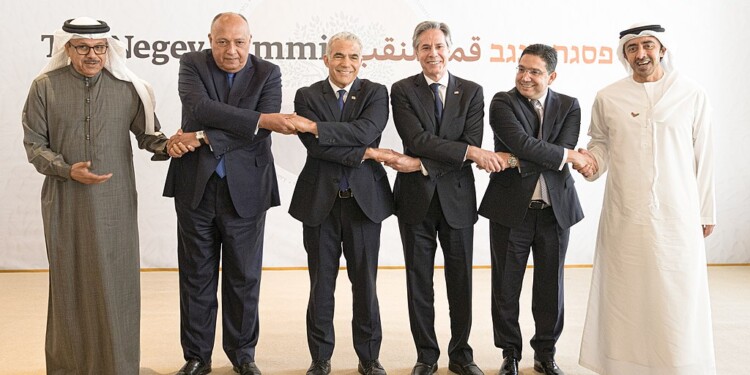It wasn’t the usual international diplomatic meeting that regularly occurs among countries. The summit in the Negev desert was a historical event, mainly because it signals a realignment of Sunni-Arab nations on the Palestinian question.
Arab countries have consistently supported the Palestinian cause and have never concealed their reproof toward Zionism (Israeli nationalism). The Arab-Israeli conflict started in 1948 after the proclamation of the state of Israel and evolved into the Palestinian question after the ’70s.
Such a conflict is an example of nationalist confrontation rooted in the indivisibility of issues. This term refers to the principle of international relations by which two contending parties struggle to compromise over a dispute as the objective of both parties is the same and cannot be partitioned or shared.
In the Israeli-Palestinian struggle, both groups want to retain exclusive control over the same piece of land as it is attached to sacred values. History intertwines with religious prophecies and tradition, creating a nationalism-boosted hiatus that fuels the continuation of conflict and demands external parties to take a clear position: you’re either with us or against us.
As hinted at above, Arab countries have been historically on the side of Palestine. They never liked Israel’s role as the gate through which the US could pry into the Middle East and have always felt a sense of solidarity toward the Palestinians inspired by Pan-Arab values. Not all Arab countries directly took part in the confrontation, but one of the meeting attendees on Monday, Egypt, was involved until 1978. Jordan, another invited country (which did not attend), was at war with Israel until 1994.
What was discussed at the Negev Summit
The rationale for the meeting is to draw a unified strategy and alliance against a possible nuclear escalation on the part of Iran. The intent of Israel is clear: gather the support of Sunni-Arab countries out of fear of the Iranian threat asking, in place of Israel’s help, the alignment of said countries on its front concerning the Palestinian question.
The chosen venue also reflected this intent: the Negev desert, near the burial site of David Ben-Gurion, Israel’s founding father. The Arab world widely stigmatized his figure since it almost represented a personification of Zionism.
Related articles: A Peace Deal in the Absence of Conflict | Unpacking the UAE-Israel Deal
However, the necessity for Arab states to reconsider their stance on the Palestinian question is not just left implicit, as the second topic discussed in the meeting (apart from the situation in Iran) was the de-escalation of the Palestinian-Israeli conflict. The focus was kept on encouraging violence prevention, as the countries shared the joint backing of a solution of co-existence.
Through his prime minister Naftali Bennet, Israel has claimed that “conditions are not right for any renewal of diplomacy with the Palestinians.”
Palestine’s prime minister Mohammed Shtayyeh has instead commented, “Unless the occupation ends, Arab normalization meetings are nothing but an illusion and free reward for Israel.”
Palestinian nationalist militias (and Arab Islamists) gave a stronger and more violent reaction.
Reactions and prospects
Throughout last week, Islamist terrorists killed more than ten people in three separate attacks in Bnei Brack, Beersheba and Hadera. Israel has deployed additional forces and prompted intelligence operations in response.
For what concerns Iran, restoring the 2015 Nuclear deal remains the gold standard. Negotiations for the agreement continue and are in an advanced stage, but the US has left no doubt on how it will confront possible adverse developments. In Blinken’s words:
“As neighbors and, in the case of the United States, as friends, we will also work together to confront common security challenges and threats, including those from Iran and its proxies.”
In a nutshell, the meeting has left us with two takeaways, or perhaps it’s just one that has two implications:
- Sunni-Arab countries intend to partner with Israel and the US in a more extensive way to fend off possible Iranian nuclear reprisals;
- Those same countries consider sacrificing their relationship with Palestine as acceptable collateral.
The latest episodes of Palestinian violence on Israeli soil that have left 11 Israeli dead in three attacks in just one week have led the Israeli military to strengthen its presence in the West Bank while a wave of arrests of Palestinians is carried out. Yesterday, Israeli forces killed two palestinians during a raid in the occupied west bank, following the deadly attacks in Israel.
All this, however, raises the question: Are these isolated terrorist attacks or are they part of a plan on the part of Palestinians to try and undo the (meagre) accord reached in the Negev Desert?
Editor’s Note: The opinions expressed here by Impakter.com columnists are their own, not those of Impakter.com — In the Featured Photo: Attendees at the Negev summit cross arms. Featured Photo Credit: Wikimedia Commons










